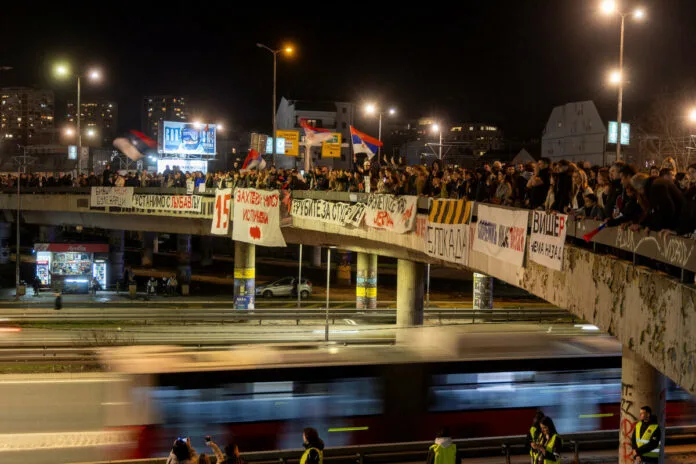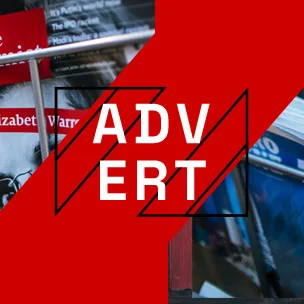Students Persist in Protests Following Prime Minister’s Resignation
Times of unrest at the faculties in Belgrade. While the aftermath of the 24-hour blockade at Autokomanda, one of the busiest roads in the city, is still fresh, students have set their sights on a new initiative: an 80-kilometer trek from Belgrade to Novi Sad. Their destination is a significant protest commemorating three months since the tragic canopy collapse at the Railway Station, which claimed 15 lives.
At least 400 students are participating in the walk. Among them is Petar Gardović from the Faculty of Political Sciences. He tells DW that he does not fear the challenge, confident that walking 40 kilometers a day is manageable when considering the ultimate goal.
“Everything we are demanding should be a given in a functioning state: those who inflict harm should be held accountable; those who commit murder should face justice; those responsible for failures should be answerable and bear the repercussions of their actions,” Petar Gardović shares with DW.
A convoy of supportive drivers follows the students, providing food, water, and medicine in case of emergencies. During their journey, they will walk by day and spend their nights beneath the stars at the football stadium in Inđija.
“Our demands remain unmet”
Earlier this week, high-ranking government officials asserted at a press conference that all student demands had been addressed and urged citizens to de-escalate tensions. However, mere hours after this call for calm, a group of young men leaving the offices of the ruling Serbian Progressive Party attacked students who were placing protest stickers around the city. One student ended up hospitalized with a dislocated jaw.
In the aftermath of the incident, Serbian Prime Minister Miloš Vučević and Novi Sad Mayor Milan Đurić resigned. President Aleksandar Vučić stated that a decision regarding whether the ruling coalition will propose a new prime minister or call for fresh parliamentary elections will be made within ten days.
“The state is patient and tolerant, but that does not mean that it should allow the destruction of individual lives. Our priority is to ensure total stability. I will take a personal role in this. Force is not the answer. It can happen, but a crime has to precede it. You would have to kill me; I will not accept it any other way,” Vučić declared.
This situation appears to have little effect on the students. “While we see that each of our demands is in the process of being addressed, none have actually been resolved yet,” Petar Gardović asserts. “The documents we requested concerning the railway station have been sent for the third time, and each time we are told they’ve been addressed. We are not taking this lightly; everything will be verified meticulously to ensure nothing is overlooked,” he adds.
On Saturday, February 1, they are planning a 24-hour blockade of all three bridges in Novi Sad, expecting students from across Serbia to join them. Professors, as well as elementary and high school students who have paused classes in support of their peers, will also attend. Farmers with tractors have already arrived, groups of bikers are gearing up, and celebrities are encouraging the public to participate via social media.
No resolution to the political crisis appears in sight.
Could elections offer a solution to the political stalemate? The consensus among opposition figures is that not until the students’ demands are fulfilled and conditions for free and fair elections are established.
The CRTA organization has been monitoring the electoral process for years. Their findings highlight numerous irregularities and systemic issues that Serbia must address to facilitate fair elections. However, the political authorities are not taking heed, as CRTA’s program director Raša Nedeljkov explains to DW.
“We have initiated numerous criminal cases that remain unresolved. We are discussing voter manipulation, pressure on public sector employees, and various criminal acts related to the voter registry,” Nedeljkov elaborates to DW.
“First and foremost, we need to see that the state, the prosecution, and the judiciary are prepared to enforce the law, sending a strong message to all electoral participants that violations will not be tolerated.”
Nedeljkov stresses that the minimum prerequisites for free elections include ensuring media freedoms, equal opportunities for all election campaign participants, and a well-organized voter registry. He finds it challenging to predict how long these improvements might take.
The opposition is likely to boycott the elections.
The majority of opposition parties have already indicated they won’t partake in any forthcoming elections. They first demand that the students’ requests be fulfilled, followed by the establishment of a transitional government tasked with preparing for free elections.
“We will not concede to Aleksandar Vučić’s manipulations or superficial solutions and we will insist that the interim government genuinely guarantees progress and begins to dismantle the Serbian Progressive Party’s influence,” said Green-Left Front MP Radomir Lazović to DW.
The Serbian Progressive Party has dismissed the idea of a transitional government, and the international community does not appear to be pressing them on this issue. Authorities boast about receiving support from both Eastern and Western sources. While Russia and the United States have explicitly backed Aleksandar Vučić’s regime, the European Union has merely stated that it is “carefully monitoring the current developments in Serbia.”
“As a pro-European party committed to the notion that EU accession is Serbia’s most critical strategic direction, I must express my profound disappointment with the European Union’s official stance on Serbia, calling for a change in their policy of supporting Aleksandar Vučić and standing alongside the citizens of Serbia seeking justice,” Lazović tells DW.
While seasoned political players hope for a shift in the international community’s approach as a potential catalyst for change, students are rallying for solidarity. They urge the citizens of Serbia to rise up and advocate for justice and change themselves—against all odds. They embark on their journey to Novi Sad to express unity, emphasizing that it is solidarity that has previously yielded results in the fight against corruption, which led to the tragic loss of 15 lives.
News


